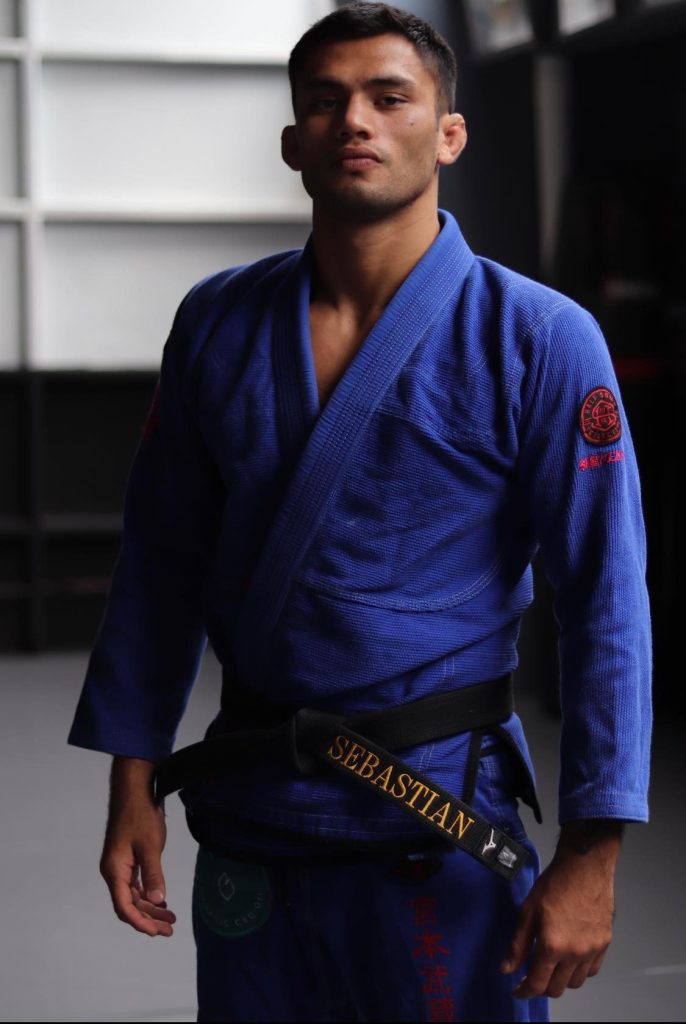Sebastián Rodríguez Williams is a Brazilian jiu jitsu champion from Curridabat, Costa Rica. He’s a four-time Panamerican Champion and is ranked 15th worldwide. He took some time to talk to El Colectivo 506 about a challenge facing all of the athletes we’ve interviewed for our November edition, “Tenacious”: the need to balance the demands of training with the entrepreneurial work of managing sponsorships and finances. He describes a fairly lonely, learn-as-you-go road that he hopes can be improved for athletes in the future. What follows is transcribed from our interview with Sebastián, edited for clarity.
I started jiu jitsu when I was 17 or 18, when one of my best friends invited me to a class. I liked it and started training about three times a week. After qualifying for a world championship in Abu Dhabi when I was around 20, I thought I was very good because I’d won everything in Costa Rica—but after seeing the level of competition there, and losing, I realized that I wanted to train harder. I just got my black belt this year, in March, and I train in New York.
There aren’t many secrets to getting ahead in the sport. There’s no magic formula. Train a lot, sleep well. Education, long hours, and extra work. Nor can I attribute my achievements to one thing: there’s my family, who support me so much, and the other people who support me. It is a team effort.
Sponsors are an essential part of that team, because without it, you have to find a job to support your life as an athlete. I decided not to work on things other than jiu jitsu, so that I could focus on training. But when I was starting to train in New York, I did everything from washing cars to being a model. When I go to Europe for competitions, I give private classes, and when I go to Costa Rica I also give classes and seminars. But basically the way I make a living is through pure hustle. Doing a little bit of everything, here and there, but always related to jiu jitsu.

To get sponsors, the most important thing is trying to win championships and advance up the rankings. There are many championships that pay money, but the best income for an athlete, which allows you to access better training, is sponsorship. Obviously, as an athlete, you go through those hard times when you have no money, but it’s about having a good exposure to get sponsorships.
All of this requires knowledge to handle it. My university has been jiu jitsu; being an athlete has been my education. My dad helped a little, always gave me advice. He is an entrepreneur, because he has a hair salon. You never learn alone. My friends at the academy always tell me, “Post a message here or there.” I have learned with the people around me. But still, when you get your first sponsorships, you sign some bad contracts. You’ll accept anything. As your level rises, you learn. Right now I have an international sponsor, Half Sumo, and four national sponsors. If it weren’t for them it would be so hard. They are Pedisanex, Boutique el Gimnasio, and Killer Buns, a restaurant.
The fourth national sponsor is my dad’s salon, The Cool Hair Band in Barrio Otoya, San José. My #1 sponsor has always been my family.

They have helped me a lot, but it has been difficult. I have sent messages to companies that I see supporting athletes outside of mainstream sports, but sometimes you get an automated response. It would be great if the big companies provided more exposure at the national level. And it would be great to have more support from the Jiu Jitsu Federation of Costa Rica, but it’s really hard to gain acceptance as a jiu jitsu athlete in Costa Rica.
When you are an athlete, you are 100% focused on effort. An architect doesn’t usually work at McDonald’s—you’re an architect and you have your architecture firm. When athletes are expected to do both, to some extent it devalues the work of those who are trying to break through in the sport. I think the Jiu Jitsu Federation in Costa Rica could do a better job of differentiating who is a professional athlete and who is not.

It is nice to be proud of your country as an athlete. Going to Europe to compete and being a European champion, as a Tico, is wonderful. So is being a Pan American champion four times. In Brazilian jiu jitsu in Costa Rica, there are many athletes. Although none have won significant things as I have, there are a couple of very good guys who are trying to break into this path of international championships.
For them and other young people to succeed in sports, they will need more support.
And yes, that depends on whether people watch more unconventional, or non-traditional sports in Costa Rica. I always like to watch all athletes, regardless of their sport, who are the best at what they do.







